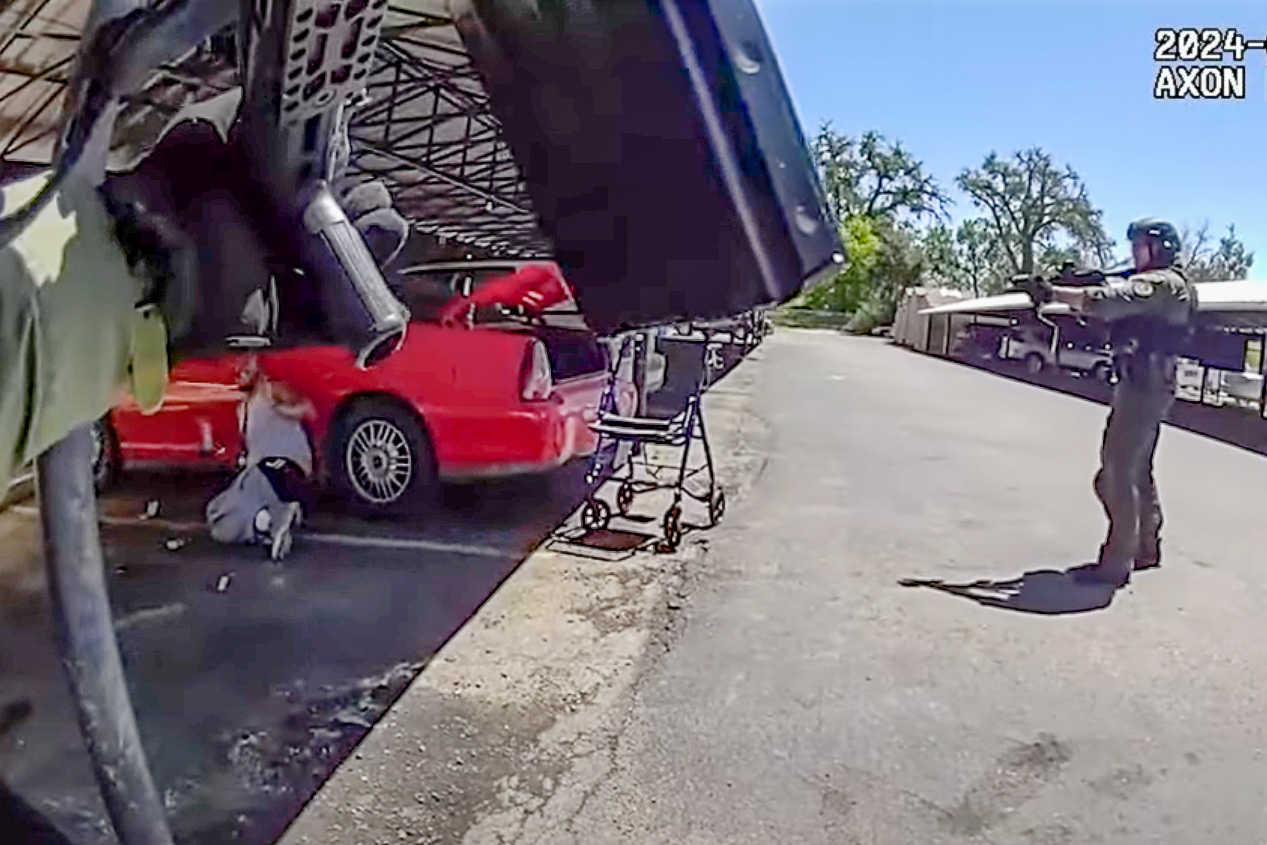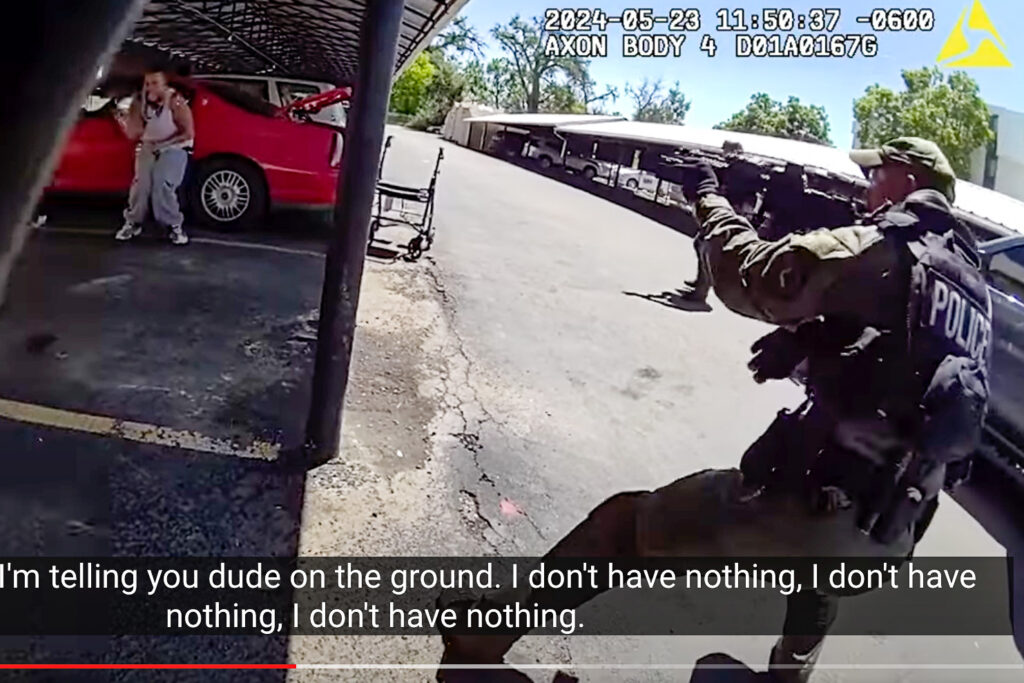
Updated at 12:58 p.m. on Thursday, June 20, 2024.
Body-worn camera video released Thursday shows that Kilyn Lewis was holding a cellphone with both hands up when an Aurora Police officer shot and killed him last month.
Three camera angles show the 37-year-old Lewis behind a red Chevy Monte Carlo with both hands visible when SWAT teams attempted to arrest him in connection to an attempted homicide that occurred earlier that month. Three officers shout multiple commands and Lewis can be seen putting his left hand into his pocket and his right hand behind his back as he turns toward two of the officers.
He then puts both hands up and is holding a black object in his right hand. That turned out to be a cell phone. He does not point it at the officers. Officer Michael Dieck, one of three surrounding Lewis, fired a single shot from his rifle.
The video released by APD is narrated by Interim Chief Heather Morris and edited to show the perspective of three officers. It shows the moment they first confront Lewis until the moment he is shot. Seven seconds pass between the time he is ordered to “get on the ground” and when the shot is fired by Dieck.
“As you will see, Lewis took several steps and placed his right hand behind his back out of view,” Interim Aurora Police Chief Heather Morris said in the video. “When his hand came back into view, he was holding an object and one of our officers fired a single shot.”
Lewis appears to be bending his knees as though he is going to comply with the command to get on the ground when Dieck fires the shot.
“I don’t have nothing! I don’t have nothing! I don’t have nothing!” he shouts as he falls to his side. He died two days later in the hospital.
At a press conference held shortly after the video was released, an attorney for Lewis’s family called the incident a “murder.”
“Aurora police officers had a duty to enforce the law that day. They failed. They didn't arrest one of their own when he clearly committed murder. What we all saw on that video is not policing,” said attorney Edward C. Hopkins. “When he took that shot, the rest of the officers looked at him with perplexity. There was a reason why they didn't take the shot. There was no reason to take the shot.”
Morris said Lewis was a suspect in a May 5 shooting that occurred in Denver near East 48th Avenue at Colorado Boulevard. She said Lewis was accused of shooting a 63-year-old man multiple times as he was walking in the area. The victim survived.

Lewis died at the hospital two days after he was shot. Dieck is on paid administrative leave as standard policy. A Critical Incident Response Team (CIRT) led by the 18th Judicial District is leading the investigation to determine if Dieck’s actions complied with state law.
“I know that nothing I can say can ease the pain this family is feeling. What I can do is ensure that a complete and thorough investigation is conducted and share those findings with our community,” Morris said. “We are committed to transparency and we will always seek ways to improve how we serve the people of Aurora.”
Dieck is a decorated 12-year veteran of the Aurora department. He previously was cleared in a 2018 shooting of a domestic violence suspect in which he fired seven shots at a man who had first fired at officers from a taxicab. That suspect survived.
Lewis’s family is being represented by Hopkins, from the firm responsible for some of the largest police misconduct settlements and verdicts in the state, Rathod Mohamedbhai. At the press conference at the firm’s offices, Lewis’ mother, LaRonda Jones, called for accountability. Jones did not watch the video. But, she can only visualize what happened to her son.
“He should be alive right now. Right here in this very presence amongst all of us. But he's not,” Jones said. “It just really don't feel real right now to me. I can't even begin to process what has happened to my son… But justice will not be denied. Just as you Officer Dieck stripped my son of his rights, I demand that you too face the consequences of your actions.”
Colorado law allows police officers to use deadly force “if the peace officer has an objectively reasonable belief that a lesser degree of force is inadequate and the peace officer has objectively reasonable grounds to believe, and does believe, that he or another person is in imminent danger of being killed or of receiving serious bodily injury,” according to state statutes.
Morris, in her narration of the video, did not address why Dieck was the only one of three officers who fired. It may ultimately be up to 18th Judicial District District Attorney John Kellner, who oversees prosecutions in Arapahoe County, or a grand jury, to determine whether Dieck had “objectively reasonable grounds to believe” his life or the lives of others were in danger from Lewis’s actions, or if he should face charges in the incident.
Lewis had been in and out of trouble with the law since he was a juvenile but had not been arrested in Colorado in a decade. His family remembered him at a wake last week as a father of two who loved his family and fishing and could be counted on to lend a hand when someone needed help.
Lewis’ wife Anndrec, said she made the hard decision to watch the footage because she needed to know what happened to her husband in his final moments.
“I watched videos and shows on television about police killings and especially killings of a Black man. I used to think nothing like that would ever happen to somebody I love. And, I know better now,” Anndrec Lewis said. “Now, I know it can happen to someone I love and my whole life has changed for the worse. This is the kind of pain that sticks with you and I hope I'll learn to deal with it better in time because this pain will never go away.”
Hopkins compared the shooting to the 2015 killing of Naeschylus Carter-Vinzant, also 37, who was killed by a single shot from an Aurora officer in March, 2015 when he pulled a cell phone from his pocket as SWAT officers chased him on foot. That case led to a $2.6 million settlement from the city to Carter-Vinzant's family, the largest in Aurora's history at the time, but a grand jury declined to indict the officer who fired the shot. The city also promised additional training and other steps to prevent future incidents.
Now, Lewis’s attorneys have demanded an apology from the mayor and city council, noting that the department has a long-documented history of violence against racial minorities, and is currently operating under a consent decree with the Colorado Attorney General’s Office, to monitor training and performance.
That consent decree was entered into after the killing of Elijah McClain in 2019. One Aurora officer was found guilty last October of criminally negligent homicide and assault in McClain’s death.
CPR News reporter Ben Markus contributed to this report.









